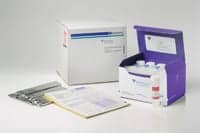Aetna has issued a positive coverage policy for the Afirma Gene Expression Classifier from Veracyte Inc, South San Francisco.

Veracyte’s genomic test is now covered for approximately 110 million patients nationwide, including through Medicare, UnitedHealthcare and other, smaller private plans.
“This should help to further reduce unnecessary thyroid surgeries and health care costs as part of thyroid cancer diagnosis,” says Bonnie Anderson, cofounder and chief executive officer, Veracyte.
The Afirma Gene Expression Classifier is offered as part of the Afirma Thyroid FNA Analysis. The solution combines specialist cytopathology assessment of thyroid nodule FNA samples with the Afirma Gene Expression Classifier, a genomic test used to clarify inconclusive results as benign or suspicious for cancer.
The Afirma test is the only molecular test clinically validated in prospective, multicenter, double-blinded trials to meet the criteria of National Comprehensive Cancer Network (NCCN) guidelines for safely monitoring thyroid nodules in lieu of invasive diagnostic surgery, according to the company.
According to the American Cancer Society, thyroid cancer is the fastest-increasing cancer in the United States, with more than 60,000 new cases expected in 2013. Among the approximately 525,000 FNAs performed on patients with thyroid nodules each year in this country, 15% to 30% of the results are inconclusive in ruling out cancer, and most physicians have traditionally recommended thyroid surgery for final diagnosis. Following surgery, however, 70% to 80% of these patients’ nodules are diagnosed as benign, the company says.
[Source: Veracyte]


